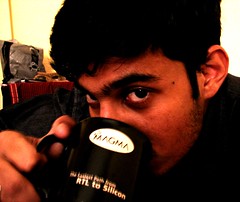East of Eden
When he was 10, my brother wrote a story called "Big family". The story is about four generations of a family starting with a poor guy becoming a rich man and the next three generations becoming lawyers, doctors and actors (I think). Then after four generations, the story comes to end. When I asked him what the story has to say, he said the story is about what happened to these people. Nothing bad happened; all of them are happy but it's still a story. And from a 10 year old, that was a profound statement.
For me to like a story, there has to be a conflict, a tug of war between characters who we relate to and whose emotions we believe are real - someone to cheer for, someone to despise, someone to live my dreams within my head as I read it. But when a book spans 700 odd pages and many generations, I have often lost interest mid way because unknowingly, there's a pattern in the events that occur, in the characters and their ways (and sometimes even in their names) and in the conflicts they face. East of Eden suffers from the same problems - not by accident but by design.
The story is based on one of the oldest stories told by the christian faith - the story of Cain and Abel and how generations of fathers and brothers go through the same act of jealousy, anger, revenge and love.
The story is set in the Salinas valley and is primarily about two families - Trasks and the Hamiltons and how these families weave themselves into each other's lives. The story is not about one man - it's about many men; many memorable men and a few strong willed women. Even the author is a character albeit an insignificant speck from where the action is, but still a voice (a lot like Samay in Mahabharatha serials on DD). If the whole book were a war, every conflict is a battle between good and evil - a good that is so innocent that you wish you could pick him from the book and save him from the pain. And an evil that is born out of yearning for love, a need that you have felt deep down that you relate to it and shudder at the thought. And like in the Mahabharatha, there is a servant (like a charioteer), who epitomizes trust, faith and makes sense of everything that happens around and philosophises profoundly.
The whole book is a proof of a life worth spent - complete with words of wisdom, religious retrospection and knowlege of human behaviour - bordering to self indulgence. It beautifully displays the complexities in the fundamental relationships between a father and a son and between brothers; shows how love, hate, jealousy and care can coexist in a single relationship, and shows it through a multitude of relationships. Characters abound, form and die within the span of the book; some stray away and some disappear but when Adam Trask speaks his last words, "Timshell" and closes his eyes the closure is absolute.
East of Eden is one of those books that let you live many lives in one. Put simply, it's the story of mankind and its varied frailities. When you see through the sub plots and the imagery, there are real people - You and me - and that self-discovery is worth the read.


3 Comments:
Its a great book! I remember the OASIS week that I spent thumbing the yellowed Cent-Li copy of this book...
I recently read the a collection of letters that Steinbeck wrote to his best friend while penning the novel abt the novel's growth, which makes for a very interesting read too.
Oh such books are there in Cent li? :) The only time I visited it properly was to take the psenti-sem snap :) The collection of letters you are talking about definitely sounds interesting. shall pick that up next :)
Oh such books are there in Cent li? :) The only time I visited it properly was to take the psenti-sem snap :) The collection of letters you are talking about definitely sounds interesting. shall pick that up next :)
Post a Comment
<< Home